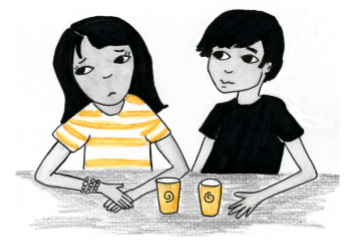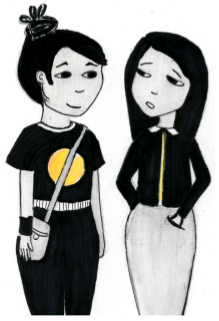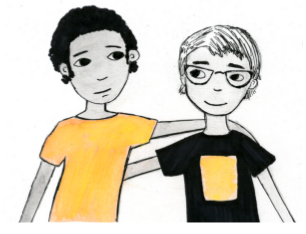Download PDF | More Info Sheets
Do you know how to talk to a friend who is feeling down or depressed?
|
|
Many people want to support a friend who is feeling down or depressed but just don't know how. Even with good intentions, they somehtimes end up saying things that do more harm than good. |
The What Helps, What Hurts 4-step guide will point you in the direction of what to say and what not to say when you want to help and support a friend.
When should I be concerned about a friend's mood?
Everybody has ups and downs, but when a low mood lasts for more than 2 weeks, and interferes with daily life, it could be depression. If you are worried that a friend might be depressed, here are some signs and symptoms to look for:
Signs and symptoms of depression:
-
Feelings of helplessness and hopelessness
-
Loss of interest in activities that used to be enjoyable
-
Appetite or weight changes
-
Sleep changes
-
Anger or irritability, being short-tempered
-
Loss of engergy, feeling tired and sluggish
-
Strong feelings of worthlessness or guilt
-
Reckless or risky behaviour
-
Trouble concentrating or remembering things
-
Unexplained aches and pains in the body
*The more symptoms that your friend has and the longer they've lasted—the more likely it is that your friend is dealing with depression. It is important to get help from a doctor or mental health professional if a diagnosis of depression is suspected.
Please note: If you feel that your friend is at risk of harming themself or someone else, help them call the mental health support line (310-6789), go to the nearest hospital, or call 911 immediately.
The 4-Step Guide to Helping a Friend with Low Mood or Depression

Step One: Check in with your friend
If you're worried about a friend's mood, the best thing that you can do is encourage them to talk about it. Here are some tips on what to say to get your friend to open up:
What helps:
|
|
You could say "I've noticed that you seem really tired recently" or "You don't seem yourself lately." Ask "How are you doing?" or "What's been happening?" |
What hurts:
Saying things like "You've been acting really weird" or "You're no fun" can cause your friend to shut down and feel judged.
Step Two: Listen
If your friend starts talking, listen and take what they say seriously. If they seem offended by your questions, make sure that you let them know that you are only asking because you care.
What helps:
You can ask "How are you feeling about this?" or "How long have you felt this way?" Let them know that you have heard them by saying, "It sounds like it's a tough time."
What hurts:
Although people have good intentions when they say stuff like "You shouldn't be worried about this" or "A lot of people have it worse than you," these words can make people in distress feel like they are being given the brush-off.
Step Three: Encourage action
Offer your support and help your friend to start thinking about what might help them feel better. If they've been feeling really down for more than 2 weeks, enourage them to reach out for professional help from a doctor or a counsellor.
What helps:
Ask "What can I do to help you get through this?" or "How would you like me to support you?" or you could say, "It might be a good idea to talk to someone who really knows how to help."
What hurts:
It can be hard to reach out for help or make changes when you're feeling down so saying things like "You just need to stop feeling sorry for yourself" can do more harm than good.
Step Four: Follow up
Stay in touch and be there for your friend. Just showing that you care and that you're not going anywhere can make a real difference.
What helps:
|
|
Say something like, "I've been wondering how you're doing" or ask "How have things been since we last talked?" |
What hurts:
Getting better can be a slow process so don't show your impatience by saying things like "It seems like you don't want to get better" or asking "Why haven't you gotten over this yet? Can't you just snap out of it?"
Helpful resources
-
For more information about the What Helps, What Hurts campaign, go to www.whathelpswhathurts.com
-
Share your story or read what other people have to say on Twitter or Instagram: #whathelpswhathurts
-
For mental health information and substance use information that you can trust, go to www.heretohelp.bc.ca
About the author

The Mood Disorders Association of BC is a member of the BC Partners for Mental Health and Substance Use Information. The organization is dedicated to providing support, education, and hope for recovery for those living with a mood disorder or other mental illness. For more, visit www.mdabc.net or call 1-604-873-0103.



